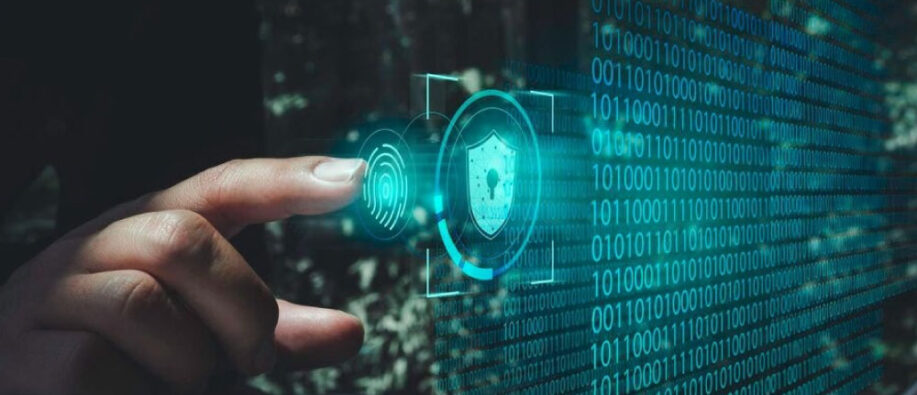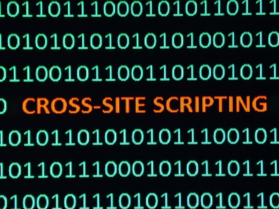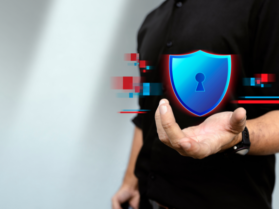Would you believe that 83% of small and medium-sized businesses are incompetent to repossess financial loss caused by cyberattacks. Despite being aware of the risk and the possibility that they wouldn't be able to recover from an attack, 91% of small businesses have not acquired cyber liability insurance. These numbers are shocking and that's why we are here with a blog post for small business owners, which will make clear all their doubts and it will give them good enough reasons to take cybersecurity seriously.
Our main focus is to provide tips to ensure the safety of your firm, but before that we have provided a few reasons why one should consider cybersecurity for small businesses seriously and what are the possible threats? Let’s dive in!
Importance of Cybersecurity for Small Businesses
As a small business owner, you must be feeling relaxed while reading news articles about cyberattacks on big firms. Instead, you must feel unsafe and be aware of possible cyber-attacks. They can also target you at any point in time. Why? Let’s understand.
Following points will illustrate what we are trying to say, and why are you a possible target of cyber threats -
Precious Data of Small Businesses
Attackers are aware of small businesses that they too have valuable data. They think that these are easy targets. They try to steal customer information such as email addresses, credit card numbers, and insurance details; employee records, bank account information, emails, passwords, and payment card details, etc. They don’t attack in a similar way every time. They use different tactics to steal data.
We can’t exactly guess why these hackers make these attacks. But a few reasons behind these attacks are to make profit for themselves, to sell that data to other hackers, to access product designs, to know business growth plans, or even to access manufacturing processes.
Costly Computing Power
In a few cases cyber attackers are only interested in using computers of small businesses. Because they want to enlist them into a large army of bots to execute huge DDoS attacks. As multiple devices are involved in these DDoS cyberattacks, they are more impactful.
Connections of small firms with big firms
In this digital era businesses are digitally connected irrespective of their size and scale. So, transactions happen on an online basis. As hackers can’t creep into big firms, they simply target small firms and get into their systems. This is definitely harmful for partnering big firms with that small firm. So, as a small business connecting with large businesses, being aware and alert while doing transactions is very necessary.
To become rich using shortcut
Another obvious and simple reason behind such attacks is money. Money matters to everyone. These highly intelligent attackers use their intelligence and try to become rich overnight.
List of Different Cyber Risks to Small Firms
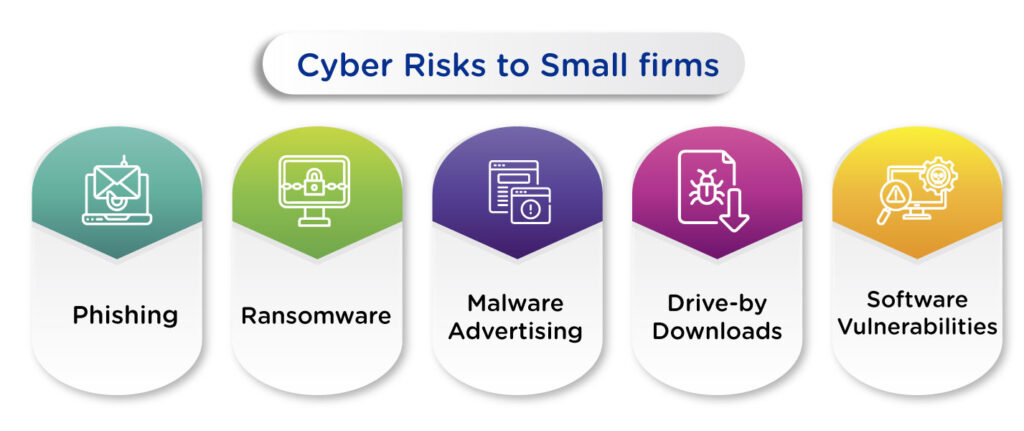
1. Phishing
In this method, the attacker provokes the user to click the emails or URL having virus and performs identity, finance, and reputation related harms to user.
2. Ransomware
Ransomware is a way in which hackers lock up computers and encrypt data. Then the owner has to pay these hackers to get their data back safely.
3. Malware Advertising
Malware Advertising is also known as Malvertising. It comprises of the practice in which hackers incorporate malware in online advertisements. This causes data loss, financial loss, or loss of customers.
4. Drive-by Downloads
By visiting a hacked website or opening a pop-up window, users might unknowingly download malware into networks.
5. Software Vulnerabilities
In order to distribute malware, hackers take use of flaws in widely used online platforms, Java tools, and file formats; systems that are not updated are especially susceptible.
Essential Tips on Cybersecurity for Small Businesses
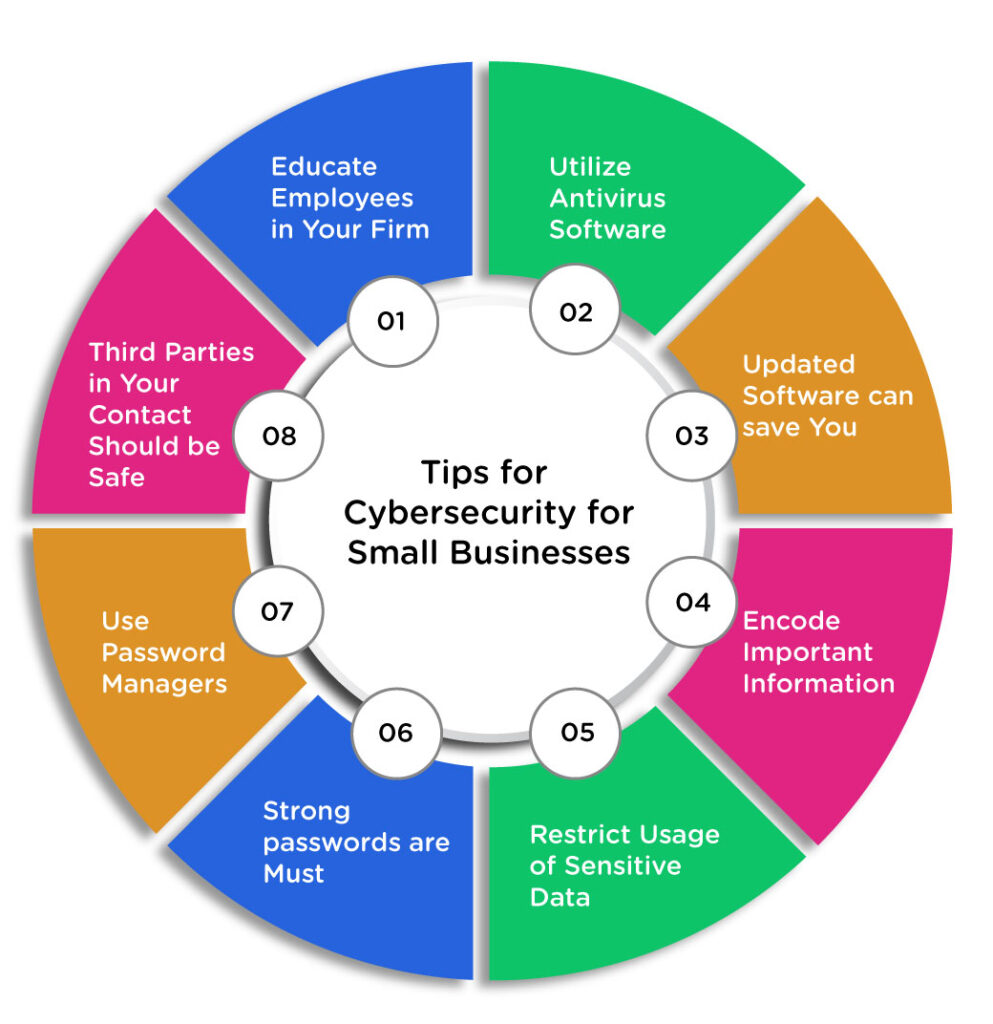
1. Educate Employees in Your Firm
There are two types of attacks we can say where employees are the source of attack. One is because of negligence of employee, and another is intentionally performed by employee. For the first kind of attack companies can implement cybersecurity training for employees. Teaching employee's prior will help to stop such attacks then and there. In other case companies have to be aware and alert while handling sensitive yet important data.
2. Utilize Antivirus Software
Phishing attacks, viruses, spyware, and ransomware can be prevented by utilizing antivirus software. That software will help you to protect data, to prevent identity theft, and to block spam and ads. So, choose antivirus software wisely and it will save business by doing its work.
3. Updated Software can save You
If one wants to keep business safe and secure, then software update is a must. Safety, new features, improved performance, and compatibility with the latest technology are the plus points of software update.
4. Encode Important Information
If business is into sensitive data handling, then to play safe encode that data. Encoding is the best solution because if hacker gets success in hacking your data, then also, they can’t do any wrong to your business as everything is encoded.
5. Restrict Usage of Sensitive Data
A minimum number of responsible people should have access to sensitive data in an organization. For this make a plan beforehand and distribute responsibilities regarding access of data to a few people. This will bring clarity, and accountability to the people involved.
6. Strong passwords are Must
This is basic but must be implemented. All employees must use strong passwords for the allotted devices. These passwords must be changed after a certain decided interval. Even small businesses can employ multi-factor authentication on employee’s devices and apps.
7. Use Password Managers
Password manager can help the business to implement strong password policy. When you need to enter websites or applications, a password manager will automatically generate the right username, password, and even the answers to security questions. In this way the time and energy of employees is saved and even safety is maintained.
8. Third Parties in Your Contact Should be Safe
When as a part of contract, you give authority to any third party to your systems, either they are suppliers or partners, irrespective of that check their trustworthiness. Also, confirm with them that they also follow all the above-mentioned practices.
Avoid Risk – Embrace Safety!
Neglecting cybersecurity puts any business in serious danger. Customers, partners, and suppliers are also at stake as businesses become increasingly linked digitally. So, we made our best effort to explain its importance.
Small businesses must use 360-degree cybersecurity measures, such as firewalls, antivirus software, and network security solutions that proactively safeguard all devices linked to their network, to safeguard against expensive malware, ransomware, and bots. This will lead to peace of mind for all individuals involved in business activities.
We hope this blog, highlighting the significance of cybersecurity for small businesses, will bring positive change leading to a safe and healthy work environment. For more insightful and knowledgeable content related to the IT world, keep visiting us at
SecureITWorld.
Also Read -
What Exactly Is a Script Kiddies in Cybersecurity?
New Research from NetApp Finds One in Five Companies Unable to Recover Data After Cyberattack
Understanding Security Services: Managed Security Services vs Cybersecurity Explained

